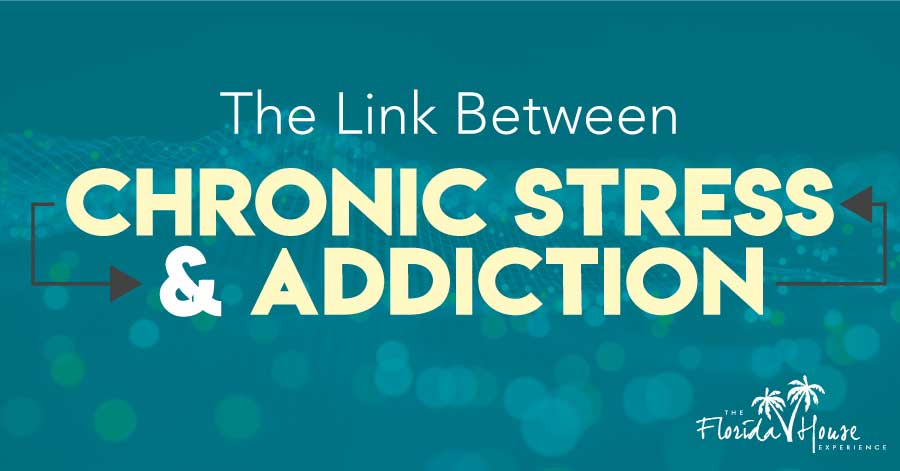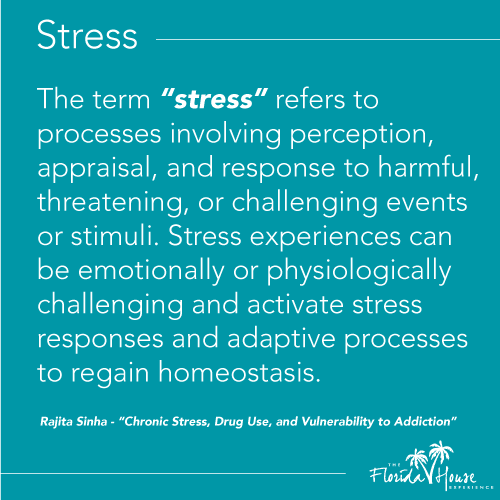
When faced with a difficult obstacle, the natural reaction is the creation of stress. Stress can be beneficial in small doses as it may increase your awareness or give you the bolt of energy sometimes needed to accomplish a task. But chronic stress, which lasts for an extended period of time, cannot be brushed off and may have negative ramifications on your physical and mental being.
At first, it may seem difficult to find outlets to help manage this stress, but these outlets do exist and are an important part of living a healthy lifestyle. Despite this fact, many people do not seek these better alternatives and instead are driven to self-medicating these emotions with drugs or alcohol to quell their uneasiness. This abuse often unintentionally leads to addiction.
Stress has been found to increase one’s chances of developing major illnesses. Adding substances is a recipe for disaster and can yield deadly results. The links between chronic stress and addiction certainly exist, and it is wise to identify them sooner rather than later.
What is Chronic Stress?
The word “stress” can be defined as, “processes involving perception, appraisal, and response to harmful, threatening, or challenging events or stimuli.” Experiences of stress can either be physiologically or emotionally challenging, but it always triggers adaptive responses to help the body return to a state of normality.
Anything that causes stress is referred to as a stressor. Physiological stressors include drug withdrawal, hunger, food deprivation, sleep deprivation, and insomnia. Emotional stressors include the death of a friend or relative, loss of a relationship, and interpersonal conflict. No matter the type, stress has long been known to increase one’s vulnerability to addiction as some people may use drugs to mask the symptoms of stress.

Chronic stress is a type of stress that is repeated or prolonged over a long period of time. It is often associated with a persistence of distress or increasing intensity, with the stressor becoming more and more unpredictable and uncontrollable. Due to this, an individual is less able to master or adapt to the stress because of the way it destabilizes the body and deregulates homeostasis.
Due to the greater magnitude of the stress and its consistent negative impact on the person affected, chronic stress often leads to a greater risk of maladaptive practices like falling victim to an addiction to cope. Excessive stress can have severe emotional consequences as well. People may abuse their own bodies’ natural defenses to combat minor occurrences of stress by pushing themselves to abuse more and more of a certain substance in an effort to relieve the chronic stress.
Stress can be broken down into a sense of worry, feeling run-down, and being overwhelmed. It is an issue that impacts human beings across demographic lines. Stress does not discriminate against race, gender, age, or economic circumstances and can also cause both psychological and physical damage that lingers long after the stress is gone. Some stress, “good stress”, can be seen as beneficial and boost the energy and drive needed to get through situations. For example, a student may need the stress of an upcoming exam or deadline to propel them to study and perform better in the long run after that short period of anxiety leading up to the stressor. However, high amounts of stress will have adverse effects on the systems in the body.
Stress and Addiction
When chronic stress goes untreated, it can lead to conditions that people try to treat on their own, inadvertently developing an addiction. It is important to note that an addiction can happen if someone chooses to self-medicate at home and even if they receive a prescription from a licensed medical professional that they are promised will be completely safe and not adversely impact their health. Studies have proven that chronic stress may induce insomnia, anxiety, muscle pain, high blood pressure, and weak immune systems, which a doctor may prescribe potentially addictive prescriptions to treat. Stress can also contribute to the development of heart disease, diabetes, Alzheimer’s disease, depression, obesity, and asthma.

Another symptom of chronic stress is pain and one of the most common ways to treat chronic pain is through medication. We have this to blame for the rising opioid crisis in the United States. In the year 2010 alone, over 210 million Americans had a prescription for opiates filled, many of them using opioids as pain relievers. Opiates bind to receptors in the brain and produce a sense of unparalleled euphoria for the user. This pleasure relieves them of the pain caused by stress and so make opioids incredibly effective.
While people may use these opiates at first to deal with stress, extended use leads to addiction. On top of this, the drugs are inexpensive, accessible, and already highly addictive. They are so addictive, in fact, that people that use it just for medical reasons to treat stress begin to exhibit patterns of addiction within a couple of days. Prescription opioids used for pain relief caused by chronic stress killed more than 28,000 people in 2014.
Drugs and alcohol are not the only things people can become addicted to. Human beings can find themselves engaging in any sort of compulsive behavior as long as it brings them, even if only initially, some sort of relief and pleasure. Stress may cause someone to develop an addiction to food. They seek stress release from so-called “comfort” foods that are most likely not nutrient or vitamin-rich. When food becomes an addiction, it is a serious issue as unhealthy living can damage all the systems in your body and weaken them. Foods high in sugar and fat can leave you with unstable blood sugar and experience mood swings, fatigue, and headaches. They contribute to cravings which also give you a sense of false hunger.
Now imagine if, on top of a food addiction caused by stress, an individual begins taking diet pills or replacing solid foods with alcohol, or abusing medication meant to stabilize those mood swings and suppress the headaches. This is where the danger of chronic stress lies, as it encourages a pattern of unhealthy behaviors and addiction.
Contact Florida House
Our lives are accelerating at such a rapid pace today. Working longer hours, managing multiple jobs, having extreme debt, paying higher bills, taking care of our families, dealing with more illness; simply getting through the day can be incredibly challenging. The more complex our schedules, the more stressors there are to tax our minds and bodies. Some pass with time while greater effort may be needed to overcome others.
Chronic stress is persistent, repeated, and extreme. It takes a toll and needs to be addressed before it leads to maladaptive coping mechanisms like abusing substances. While there are many ways to treat stress, many people, unfortunately, turn to drugs for relief and end up developing an addiction. Substances are never the answer, as self-medicating can have detrimental effects. If you or someone you know is battling stress and/or addiction, please contact us today at 833-596-3502 to find out how to balance the two in the healthiest way.






